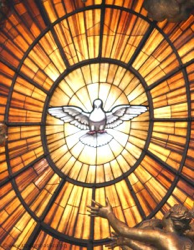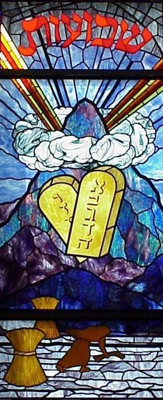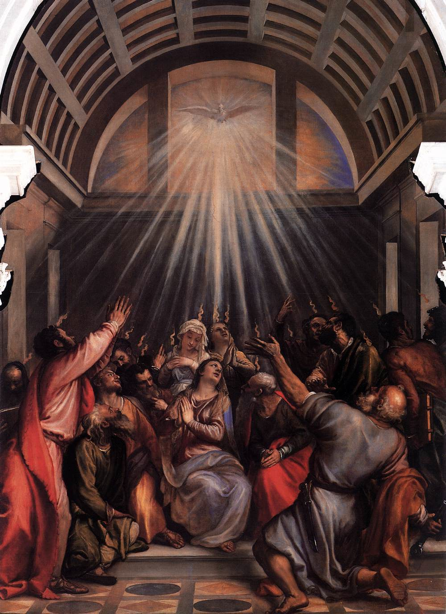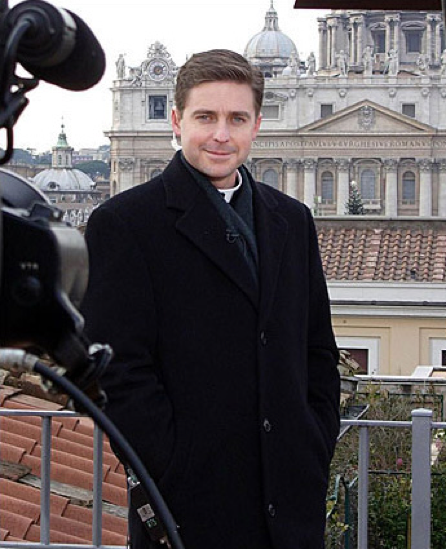Inherit the Wind: Pentecost and the Breath of God
 From Creation onward, Scripture often depicts the Holy Spirit as the wind or breath of God. When it swept through Jerusalem at Pentecost, all divisions ceased. In mid-July last year, I wrote "Hot Town: Summer in the Slammer." My title was a spoof of "Summer in the City," the famous 1969 hit single by "The Lovin' Spoonful." I was sixteen years old when that song hit the charts, but my post about it forty years later was sparked by more current heat in my life: the long, hot summer days in prison.The sealed and barred window in my prison cell faces due west, so on the hottest summer days there's a build-up of heat in a sort of greenhouse effect within these stone walls, and it can feel unbearable at times. The windows let in heat, but no air. There are no curtains or shades in prison, and covering cell windows is forbidden. By late in a typical summer day, this cell can feel like a crucible from which there is no escape.Underneath each cell window is a small security grate, a five-inch high double-grated steel slot venting through the stone wall to the outside world. By summer each year, the grates are so clogged with dust that not even a hint of moving air passes through them. Prisoners are always trying to devise new ways to clean the small vent.On one of the hottest days last summer, I watched with great hope out my cell window as towering thunderclouds built in the west late in a stifling afternoon. They grew denser and darker, and then the rarest of things happened. A blast of cool wind flowed out of the west, through the security grate, and filled this cell with cool air. Then came thunder and a torrential rain that released all the day's heat built up in these stone walls. Blast after blast, the cool wind kept coming. It felt like the very Breath of God.This post is about the wind, but first I owe thanks to playwrights Jerome Lawrence and Robert E. Lee for my use of the title of their great 1955 American play, "Inherit the Wind." The play was based on the so-called "Scopes Monkey Trial" of 1925 in which the famous defense lawyer, Clarence Darrow defended John Scopes in a Tennessee court. A high school biology teacher, John Scopes, was charged with violating state law by teaching Darwin's theory of evolution in science class. In 1925 Tennessee, this violated a state-sanctioned fundamentalist view of the Biblical account of Creation. I wrote about our culture's conflict between science and religion in "Does Stephen Hawking Sacrifice God on the Altar of Science?" Religion is not a topic for scientific inquiry, and science should not be refuted In the name of religion. Those are human conflicts, not God's.Most people don't know that "Inherit the Wind," - both the play and the classic 1960 Spencer Tracy film - first borrowed the title from the Book of Proverbs: "He who troubles his household will inherit the wind, and the fool will be servant to the wise." (Proverbs 11:29). It's just possible that the Book of Proverbs itself borrowed the phrase from an even more ancient source: the followers of Pazuzu, the Assyrian god of wind and pestilence. In some ancient Mesopotamian religions, "an ill wind" carried the spirits of demons, and so to inherit the wind could mean generations of suffering for one person's sin.WHEN THE DAY OF PENTECOST CAMEI borrowed the title with a very different connotation. There are 181 references to wind in the Judeo-Christian Scriptures, and many of them are equated with a sacred wind or with the Breath of God. The Hebrew word for both "breath" and "wind" is "ruah," and the Hebrew name for the Holy Spirit is "ruah ha-Qodesh," simultaneously meaning the Spirit of God, the Wind of God, and the Breath of God.Last year in "Pentecost in the Year of the Priest," I described the image of the Spirit of God being like a wind as ancient. The very first time I picked up a Bible as a child, I was enthralled by a single image that begins the story of our existence in a created Universe with God. It was told in a few simple sentences that taught nothing about the science of cosmology except the most basic fact that I described in "A Day Without Yesterday." It had to do with the fact of Creation, not the mechanics of it, and it filled me with wonder:
From Creation onward, Scripture often depicts the Holy Spirit as the wind or breath of God. When it swept through Jerusalem at Pentecost, all divisions ceased. In mid-July last year, I wrote "Hot Town: Summer in the Slammer." My title was a spoof of "Summer in the City," the famous 1969 hit single by "The Lovin' Spoonful." I was sixteen years old when that song hit the charts, but my post about it forty years later was sparked by more current heat in my life: the long, hot summer days in prison.The sealed and barred window in my prison cell faces due west, so on the hottest summer days there's a build-up of heat in a sort of greenhouse effect within these stone walls, and it can feel unbearable at times. The windows let in heat, but no air. There are no curtains or shades in prison, and covering cell windows is forbidden. By late in a typical summer day, this cell can feel like a crucible from which there is no escape.Underneath each cell window is a small security grate, a five-inch high double-grated steel slot venting through the stone wall to the outside world. By summer each year, the grates are so clogged with dust that not even a hint of moving air passes through them. Prisoners are always trying to devise new ways to clean the small vent.On one of the hottest days last summer, I watched with great hope out my cell window as towering thunderclouds built in the west late in a stifling afternoon. They grew denser and darker, and then the rarest of things happened. A blast of cool wind flowed out of the west, through the security grate, and filled this cell with cool air. Then came thunder and a torrential rain that released all the day's heat built up in these stone walls. Blast after blast, the cool wind kept coming. It felt like the very Breath of God.This post is about the wind, but first I owe thanks to playwrights Jerome Lawrence and Robert E. Lee for my use of the title of their great 1955 American play, "Inherit the Wind." The play was based on the so-called "Scopes Monkey Trial" of 1925 in which the famous defense lawyer, Clarence Darrow defended John Scopes in a Tennessee court. A high school biology teacher, John Scopes, was charged with violating state law by teaching Darwin's theory of evolution in science class. In 1925 Tennessee, this violated a state-sanctioned fundamentalist view of the Biblical account of Creation. I wrote about our culture's conflict between science and religion in "Does Stephen Hawking Sacrifice God on the Altar of Science?" Religion is not a topic for scientific inquiry, and science should not be refuted In the name of religion. Those are human conflicts, not God's.Most people don't know that "Inherit the Wind," - both the play and the classic 1960 Spencer Tracy film - first borrowed the title from the Book of Proverbs: "He who troubles his household will inherit the wind, and the fool will be servant to the wise." (Proverbs 11:29). It's just possible that the Book of Proverbs itself borrowed the phrase from an even more ancient source: the followers of Pazuzu, the Assyrian god of wind and pestilence. In some ancient Mesopotamian religions, "an ill wind" carried the spirits of demons, and so to inherit the wind could mean generations of suffering for one person's sin.WHEN THE DAY OF PENTECOST CAMEI borrowed the title with a very different connotation. There are 181 references to wind in the Judeo-Christian Scriptures, and many of them are equated with a sacred wind or with the Breath of God. The Hebrew word for both "breath" and "wind" is "ruah," and the Hebrew name for the Holy Spirit is "ruah ha-Qodesh," simultaneously meaning the Spirit of God, the Wind of God, and the Breath of God.Last year in "Pentecost in the Year of the Priest," I described the image of the Spirit of God being like a wind as ancient. The very first time I picked up a Bible as a child, I was enthralled by a single image that begins the story of our existence in a created Universe with God. It was told in a few simple sentences that taught nothing about the science of cosmology except the most basic fact that I described in "A Day Without Yesterday." It had to do with the fact of Creation, not the mechanics of it, and it filled me with wonder:
"In the beginning, God created the heavens and the earth. The earth was without form and void, and darkness was upon the face of the deep; and the Spirit of God was moving over the waters." (Genesis 1:1-2 RSV).
The New Revised Standard Version of the Bible (NRSV Catholic Edition) translated this more literally: "A Wind of God swept over the face of the waters." The only thing in existence in the Universe that God did not create is darkness. Darkness is the one reality that was already there at the moment of Creation. The darkness isn't a description of something evil, but rather of something absent. The Wind of God moved above its unfathomable depth, and then, with a spoken word, "Let there be light," there was light, and light overcame the darkness.The Breath of God has stirred throughout human history ever since, and each time it does, we change dramatically. In the moment man became man, God "breathed into his nostrils the breath of life, and man became a living being" in the image and likeness of God (Genesis 2:7). That same image is reflected in the account of the Resurrection appearances of Jesus in the Gospel of John before Pentecost:
"He breathed on them and said, 'Receive the Holy Spirit.'" (John 20:22).
I will forever think of that blast of cool wind through my cell when I read the story of Pentecost in the Acts of the Apostles:
"When the day of Pentecost had come, they were all together in one place. And suddenly a sound came from heaven like the rush of a mighty wind, and it filled the house where they were sitting. There appeared to them tongues as of fire, distributed and resting on each of them, and they were filled with the Holy Spirit." (Acts 2:2-4).
Saint Luke was a great writer. In three matter-of-fact sentences, with no flourish whatsoever, he conveyed a meeting between God and humankind that would be told for thousands of years. Understanding its setting explains a lot about its meaning, and what happened next.Some people mistakenly assume that the "Day of Pentecost" referred to is the coming of the Holy Spirit that Saint Luke goes on to describe, but it isn't. The "Day of Pentecost" was the reason the Apostles were in Jerusalem in the first place, and "all together in one place," and it’s the reason why "devout men from every nation under heaven" (Acts 2:5) were there. They had all come because Shavuot required a pilgrimage to Jerusalem. Shavuot is the second of three "pilgrimage festivals" in Jewish faith. The other two are Passover itself, and "Sukkot," the Feast of Booths (or "Tents") which was the Jewish autumn festival marking the harvest of wheat. The Sukkot pilgrimage to Jerusalem was set down in the Book of Leviticus (23:42) and recalls the forty years of wandering and encampment in the desert after the Exodus (hence the "booths" or tents). Sukkot was the setting for the Gospel account of the Transfiguration of Jesus (eg., Mark 9:2-13). Each of the three pilgrimage festivals - as described in the Book of Deuteronomy (16:16) - required adult men of Israel to travel to Jerusalem to mark the feast.The Shavuot festival known in Greek as Pentecost (meaning "fifty days"), is also called the "Festival of Weeks" because it's celebrated on the day after the passage of seven full weeks from Passover. Shavuot originally marked the end of the barley season and the beginning of the wheat season. The pilgrimage required that the first fruits of wheat be brought to Jerusalem as an offering as described in the Book of Leviticus (23:15-17). The feast fell on the Sixth day of the Hebrew month, Sivan. In Rabbinic legend, that was also the date marking the giving of the Torah to Moses on Mount Sinai described in Deuteronomy 19, and that became the main reason for the pilgrimage feast. At Shavuot, specially baked twin loaves made from newly cut wheat were presented in the Jerusalem Temple with great ceremony to commemorate the Tablets of the Law given to Moses on Mount Sinai. This year in our Gregorian calendar, the Sixth day of Sivan falls on June 8th.This is the setting for Pentecost In the Book of Acts, Chapter two. As that driving wind filled the room where the Apostles were gathered, "men of every race and tongue, of every people and nation" emptied into the street at the strange and powerful noise. The mighty wind and tongues of fire described by Saint Luke were reminiscent of the loud wind and fiery descent of the Spirit of God on Mount Sinai at the time of the Exodus:
Shavuot is the second of three "pilgrimage festivals" in Jewish faith. The other two are Passover itself, and "Sukkot," the Feast of Booths (or "Tents") which was the Jewish autumn festival marking the harvest of wheat. The Sukkot pilgrimage to Jerusalem was set down in the Book of Leviticus (23:42) and recalls the forty years of wandering and encampment in the desert after the Exodus (hence the "booths" or tents). Sukkot was the setting for the Gospel account of the Transfiguration of Jesus (eg., Mark 9:2-13). Each of the three pilgrimage festivals - as described in the Book of Deuteronomy (16:16) - required adult men of Israel to travel to Jerusalem to mark the feast.The Shavuot festival known in Greek as Pentecost (meaning "fifty days"), is also called the "Festival of Weeks" because it's celebrated on the day after the passage of seven full weeks from Passover. Shavuot originally marked the end of the barley season and the beginning of the wheat season. The pilgrimage required that the first fruits of wheat be brought to Jerusalem as an offering as described in the Book of Leviticus (23:15-17). The feast fell on the Sixth day of the Hebrew month, Sivan. In Rabbinic legend, that was also the date marking the giving of the Torah to Moses on Mount Sinai described in Deuteronomy 19, and that became the main reason for the pilgrimage feast. At Shavuot, specially baked twin loaves made from newly cut wheat were presented in the Jerusalem Temple with great ceremony to commemorate the Tablets of the Law given to Moses on Mount Sinai. This year in our Gregorian calendar, the Sixth day of Sivan falls on June 8th.This is the setting for Pentecost In the Book of Acts, Chapter two. As that driving wind filled the room where the Apostles were gathered, "men of every race and tongue, of every people and nation" emptied into the street at the strange and powerful noise. The mighty wind and tongues of fire described by Saint Luke were reminiscent of the loud wind and fiery descent of the Spirit of God on Mount Sinai at the time of the Exodus:
"On the morning of the third day there were thunders and lightning and a thick cloud upon the mountain, and a very loud trumpet blast, so that all the people who were in the camp trembled. Then Moses brought the people out of the camp to meet God, and they took their stand at the foot of the mountain. And Mount Sinai was wrapped in smoke, because the Lord descended upon it in a fire." (Exodus 19:16-19).
THE FIRST CATHOLIC SCANDAL!Filled with the Holy Spirit, the Apostles began to address the bewildered crowd gathered in Acts Chapter two. Each person heard them speaking in his own native tongue, an event that in effect reversed the "tragedy of Babel" in which men became divided by foreign languages in the Book of Genesis (11:1-9). In Acts, the Holy Spirit filled not only the Apostles, but many of the crowd as well, "and there were added that day about three thousand souls." (Acts 2:41).

It was on that day that the Church was born, and before it was even ten minutes old, scandal broke out. Those in the crowd who did not "inherit the wind" immediately accused the Apostles of being drunk at 9:00 in the morning on a major holy day that required a morning fast. Their claims forced Saint Peter into the first Papal defense of the Church:
"Men of Judea and all who dwell in Jerusalem, let this be known to you, and give ear to my words. For these men are not drunk, as you suppose, since it is only the third hour of the day." (Acts 2:14-15).
Saint Peter went on to preach the Church's first homily, relying on the Prophet Joel (2:28-32) to explain that God poured out His Spirit because the Messianic Age had begun. The meaning of The Passion of the Christ was revealed, and as I wrote in "The Beatification of Pope Paul II" the Apostolic Succession that first preached Christ continues even today in human history. There is no human institution on earth that has endured for so long in human history. For me, this is the real evidence that the Church inherits the wind. There is no human language, culture, or government that has existed in linear succession for so long. It's safe to say that no human conflict can put asunder what God Himself has joined. To suggest that a 21st Century tabloid sex scandal can destroy the Church is pure folly.The point is brought home often in the news headlines, and a great example was in a May 10, 2011 column by Mary Kissel in The Wall Street Journal ("A Cardinal's Warning on China"). Mary Kissel wrote of China's Communist regime and its interference in the selection and ordination of Catholic bishops. She summed up the state of affairs quite well:
"The Holy See is thousands of years old; the Chinese Communist Party has ruled for little over six decades, and it faces all kinds of internal instability and challenges to its illegitimate rule. When the regime eventually falls, China will be the holy grail of Catholic missions." (WSJ Editorial Page, May 10, 2011).
GOD WANTS YOU HAPPYI have a particular challenge as I mark this 17th Pentecost in prison. As I wrote in "The last Full Measure of Devotion,” more than the loss of freedom Itself, I mourn the passing of the world beyond these stone walls. Sometimes my faith strains under the weight of an unjust imprisonment, but when something as simple as a blast of cool wind through this cell on a blistering summer day can remind me of Pentecost, I have hope.

I've been reading a terrific new book entitled God Wants You Happy: From Self-Help to God's Help, by Father Jonathan Morris (HarperOne, 2011). It isn't the usual cliché driven psycho-babble that dominates the market of self-help books. There's something solid here that people of faith can use to help anchor their lives under any circumstances.Father Jonathan Morris is a news analyst for FOX News, and I have applauded both him and the network for the obvious value placed on including an ethical and theological perspective on the news, especially religious news. If you read my post, "Sitting in Your Own Pew," then you have an idea of the great abyss left by the secularization of Western Culture. Religion and religious ideals are important aspects of the news stories all around us. As a people and as a culture, we ignore them to our peril.But there's another reason I wanted to read Father Jonathan Morris's newest book. He was the theological adviser in the production of Mel Gibson's film, “The Passion of the Christ," an important film for the many reasons I described during Holy Week in "Simon of Cyrene and the Scandal of the Cross."Early in God Wants You Happy, Father Jonathan wrote something I much needed to read as I mark another Pentecost in prison:
"I was being reminded by grace of God's promise to us: he will bring out of every bad situation, out of every single instance of pain and suffering in our lives, a greater good - yes, an even greater good than the goodness we are missing now - if we let him." (p. 3-4).
This Pentecost, Father Jonathan Morris reminded me that both our joys and our trials are part of the great tapestry of life in the Spirit to which we belong. It's a tapestry that's one, holy, Catholic, and Apostolic, and through which all of us - saints and sinners alike - inherit the wind.
"For in this hope we were saved. Now hope that is seen is not hope. For who hopes for what he sees? But if we hope for what we do not see, we wait for it with patience. Likewise, the Spirit helps us in our weakness, for we do not know how to pray as we ought, but the Spirit himself intercedes for us with sighs too deep for words. And he who searches the hearts of men knows what is the mind of the Spirit." (Romans 8:24-27).
![]()